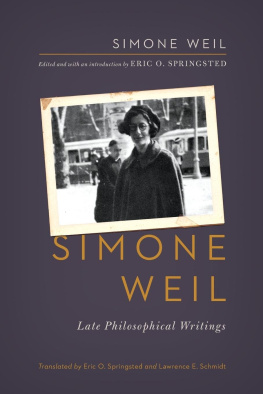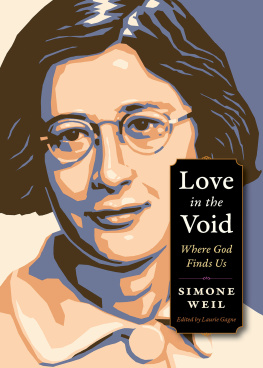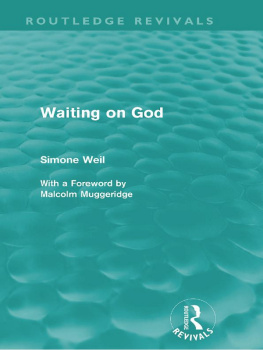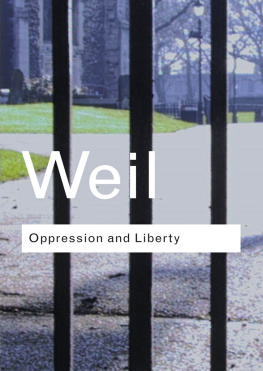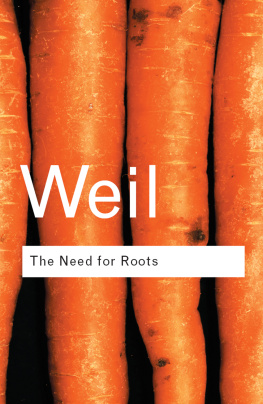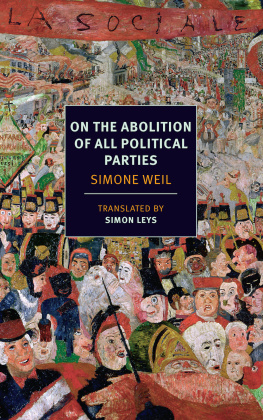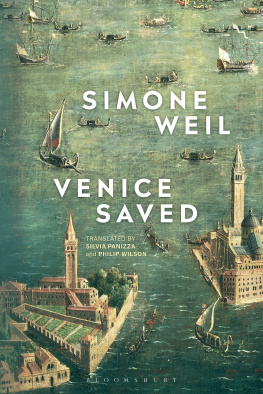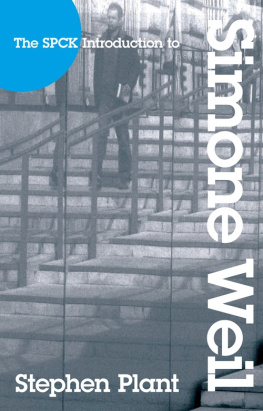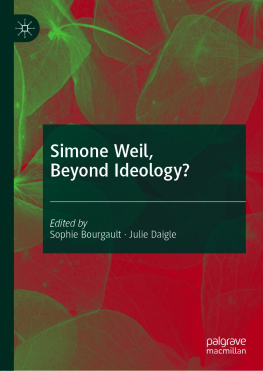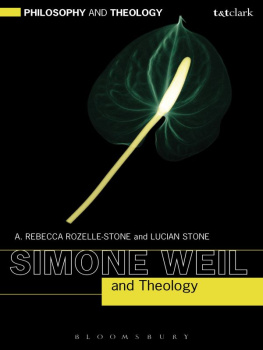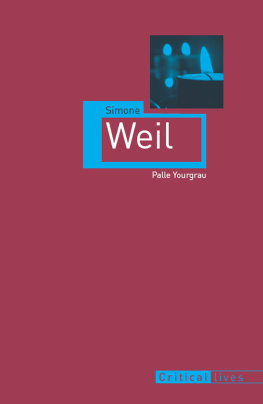With the exception of What Is Sacred in Every Human Being?, which comes from the time Weil was in London in 1943, all of the texts presented here were written during her time in MarseilleSeptember 1940 to May 1942. The texts used are the ones established and published in the Oeuvres compltes IV.1 and IV.2 (Paris: Gallimard, 2008, 2009), again excepting What Is Sacred in Every Human Being?, which comes from crits de Londres (Paris: Gallimard, 1957). In the case of three essays, the Oeuvres compltes edition varies from earlier editions, most notably in a number of additional pages included in At the Price of an Infinite Error: The Scientific Image, Ancient and Modern, the arrangement of various paragraphs in God in Plato, and some small changes in The First Condition for the Work of a Free Person, where Weils original is restored after certain editorial changes had been made by the publication for which that essay was intended. This is the first English edition of these essays in their complete and corrected form.
Three essays are also translated and published in book form in English for the first time here: Essay on the Concept of Reading, Some Reflections on the Concept of Value, and Notes on the Concept of Character.
Titles in some cases have been changed from their first English translation. Human Personality is here What Is Sacred in Every Human Being?; Morality and Literature is Literature and Morals; The Responsibility of Writers is The Responsibilities of Literature; The First Condition of Non-Servile Work is The First Condition for the Work of a Free Person; Classical Science and After is At the Price of an Infinite Error: The Scientific Image, Ancient and Modern.
The translation of Some Reflections on the Concept of Value was originally published in Philosophical Investigations 37.2 (2014): 10512, and is reprinted by permission of Wiley-Blackwell.
I would like to thank Lawrence Schmidt for his kind and gracious offer to include his translation of The First Condition for the Work of a Free Person. I would also like to thank my longtime friend and philosophical correspondent, Stephen Goldman, for his reading of several of these translations, his suggestions, and above all for the conversation that followed.
Simone Weil on Philosophy
It can be highly misleading to separate out a complex thinkers works too neatly into discrete subjects if one wants to understand the thinker herself. This is especially the case with somebody such as Simone Weil. Her works cover philosophy, history, social matters (such as justice, labor, and politics), mysticism, world religions, and subjects belonging to Christian theology. Valuable as these insights may be to those fields individually, there is an intellectual character to all of them that clearly shows they come from a single, and singular, mind. The insights are valuable in themselves, but the thinker transcends them. For anyone to say who Weil is as a thinker, and what she has to teach anybody, and to say it accurately, much less well, one ultimately has to take into consideration all of her work as a whole and its complex overlapping.
Still, it can be a very helpful exercise to take up the question of Weils thinking about philosophy as a particular subject, that is, to take up what she thought thinking is and ought to be and hence what she thought she was doing in writing all that she did. It is to take up what she thought the value of her work was and, as it turns out, what her thinking on value was.
But in treating what Weil thought philosophy is, we need to be careful about what exactly we are doing. Numerous books and articles on Weil have treated her from a philosophical point of view. But doing so can present certain problems, most generally when one fails to see where her interests and concerns go far beyond what academic philosophers normally treat. There are a number of places where this happens. Above all, to approach her in a strictly philosophical way will often completely missoften deliberatelya genuine and central theological commitment in Simone Weil the thinker, or will miss it as a theological or religious commitment. Her Christianity, as unorthodox as it often appears, is not an addendum or a conclusion to a chain of reasoning from elsewhere. For her, there really is an act of God that takes place in Christs Incarnation and Crucifixion that determines the nature of the world and of human beings. This conviction was something she herself admits that she came by unexpectedly through personal experience, and not by a process of reasoning. She even goes so far as to suggest that her reason wasnt quite sure what to do with what was indeed a certitude in her life. Yet, lest one mistake things on the other side, it also needs to be understood that this religious commitment does not make serious and unremitting philosophical reflection beside the point for Weil. Far from it. She is not just an anthology of mystical insights. So, how this commitment and philosophy go together is of the first order for understanding Weil. It is a matter of getting it right on both sides of the equation.
A second mistake occurs when one treats her as a philosopher in the sense that she is somebody who produces a philosophy. This is more than a problem of ignoring the obvious and oft-repeated fact that Weil is not a systematic thinker. Even though she is not, she is not an incoherent thinker, and what she says in one place often really does have bearing on what she says elsewhere. She thinks in a highly analogical way and finds some very startling and striking connections between otherwise disparate areas of thought. For this reason, it really is possible to provide some sort of conceptual map of the distinctive parts of her thinking. It is possible to teach somebody what significant things she has to say, and it is possible to show a person how to move from one concept to another in her thought. She is not an oracle. Rather, the mistake comes in thinking that once one has provided such a map that one has said what she was trying to do as a philosopher. For example, one might be tempted once such a map has been drawn then to compare her various positions as a philosopher with those of other philosophers. Though she has startling and discernible positions, one might be tempted to think that such positions are what she thinks philosophers ought to be coming up with, and that philosophy, as it is in the academy, is a matter of continually arguing for and against these positions. One can see where this has happened in treating Weil, even from the very beginning of the secondary literature on her. For example, Miklos Vet, He is also quite helpful in regularly pointing out the degree to which Weil was indebted to Plato and to Kant. But Vet also was insistent that Weil was a classical metaphysician, which is to say, he thinks that she was doing something like building a position, and that not only can one compare it to others, say, Kant, but that one intellectually ought to be doing that. But that is exactly what is at stake, at least insofar as Weil herself saw the nature of philosophy, because she did not think philosophy was that at all.

